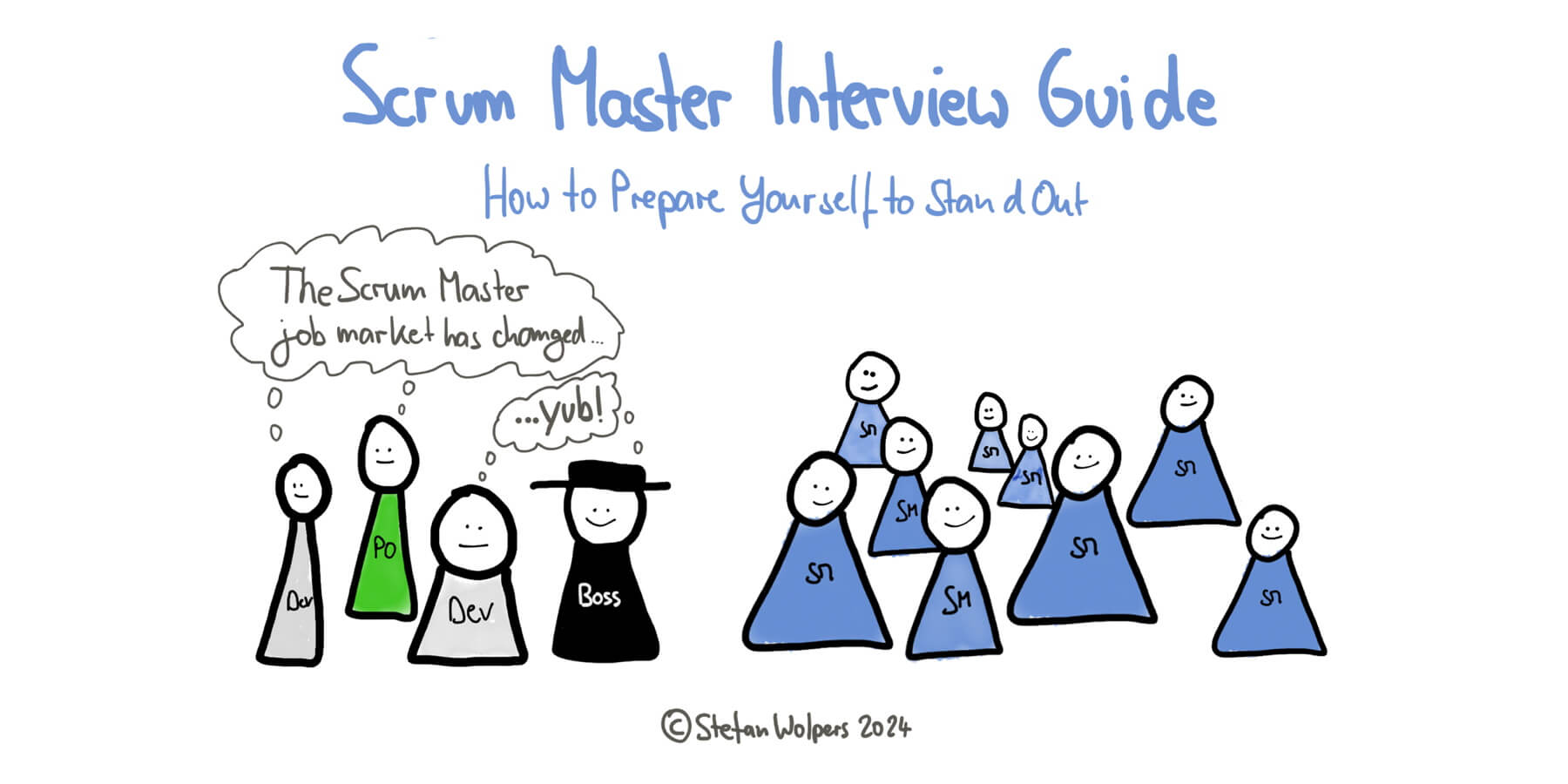Scrum Master Interview 2024
Learn how to prove your indispensable value in driving organizational success as you prepare for your Scrum Master job interview.
TL; DR: Scrum Master Interview 2024
In today’s tight job market, standing out as a genuine Scrum Master is crucial amidst a sea of imposters. Shining during the Scrum Master interview is an essential first step: Elevate your candidacy by detailing how you successfully applied Scrum in challenging environments, showcasing advanced practices and techniques, and sharing your engagement with the agile community.
The following post will support your effort to demonstrate your pivotal role in agile transformations and strategic contributions, proving your indispensable value in driving organizational success.

Preparing for Your Scrum Master Interview as a Candidate
Originally, the Scrum Master Interview Guide was intended to help those making hiring decisions.
Of course, over the years, it has also widely spread among Scrum Masters looking for new opportunities. If you are currently looking for a new position, preparing for a Scrum Master interview in today’s competitive job market requires a strategic and comprehensive approach.
However, reading the original questions and suitable answers no longer suffices nowadays. The following suggestions may help experienced Scrum Masters not merely succeed in their interviews but distinctly stand out:
1. Advanced Scenario Preparation
Complex Problem Solving
Describe scenarios where you implemented Scrum in challenging environments, such as teams resistant to agile practices or projects with tight deadlines and budget constraints. For example, use the STAR method — Situation, Task, Action, Result — to provide concrete examples of how your support led to measurable improvements in process and product quality.
Scalable Solutions
Illustrate your experience “scaling” Scrum practices for larger teams or multiple teams, highlighting your role in addressing integration issues, dependency management, and maintaining alignment between teams to ensure cohesive product development.
2. Demonstrating Continuous Learning and Thought Leadership
Advanced Qualifications and Contributions
Discuss your advanced qualifications, such as the PSM III, or contributions to thought leadership (articles, webinars, workshops, Meetups, conferences) that highlight your deep commitment to the agile community.
Applied Learning
Provide examples of how you’ve applied new learning or trends in agile practices to real-world projects. Discuss your adaptive strategies and innovations in the framework, showcasing your proactive career and skill development approach.
3. Feedback Loops and Team Development
Constructive Feedback
Share specific instances where you used constructive feedback to coach or mentor team members, leading to notable improvements in their performance and engagement.
Retrospectives and Continuous Improvement
Elaborate on how you facilitated effective Retrospectives that led to actionable insights and rapid implementation of improvements, fostering a culture of continuous growth and agility within the team and at personal levels.
4. Proficiency in Tools and Technologies
Tool Integration
While the mechanical application of tools is often frowned upon in the community, they are a fact in corporate life. Therefore, be able to detail your experience with integrating and customizing tools like Jira, Confluence, or Asana to fit the specific needs of your teams and projects. Discuss how these tools enhanced project transparency, tracking, and team collaboration, and where their contribution did not justify the effort.
Metrics and Reporting
Explain how you identified suitable metrics and utilized their data to generate insights, track progress, and make informed decisions that drive project success and align with business goals.
5. Visionary Leadership and Organizational Impact
Agile Transformation Initiatives
Discuss your role in broader organizational changes towards agility. Highlight your involvement in training sessions, creating agile advocacy groups, or leading transition initiatives that have significantly shifted the organizational culture and processes towards a more agile mindset.
Long-Term Strategic Contributions
Illustrate how your strategic thinking and agile expertise have contributed to the long-term success of past employers, such as by increasing ROI, reducing time-to-market, and enhancing product quality.
Focusing on these comprehensive and detailed preparation strategies will demonstrate your deep understanding of Scrum and general agile practices and your ability to apply them effectively to drive actual business results, setting you apart from other candidates.
Employ the Scrum Master JobGPT as a Sparring Partner
If you have a ChatGPT subscription available, I also recommend employing the Scrum Master JobGPT as a sparring partner to prepare for the Scrum Master interview.
This free tool delivers actionable insights on job hunting, interview prep, and evaluating Agile maturity in potential employers, based on my years-long writing on identifying suitable employers and clients, passing job interviews with flying colors, and hiring team members while respecting Scrum’s principles.
With Scrum Master JobGPT, you’ll get practical guidance—from deciphering job ads to excelling in interviews and ensuring the right cultural fit. Let’s weather this storm together—leverage Scrum Master JobGPT to secure your next Scrum Master or Agile Coach role and advance your career (see Scrum Master JobGPT: Your New Tool for Thriving in the Current Job Market).
Conclusion
In an increasingly competitive job market, genuine Scrum Masters need to differentiate themselves from the many imposters. As you prepare for your following Scrum Master job interview, remember that your ability to articulate sophisticated problem-solving techniques, continuous professional development, and a strategic approach to agile implementation will set you apart.
Focus on demonstrating your deep practical knowledge, adaptability, and leadership skills when applying Scrum principles. By showcasing your real-world successes and innovative contributions, you solidify your position as a candidate and a potential crucial asset to any agile organization. In other words, get out of being regarded as a cost and become a value creator.


Comments